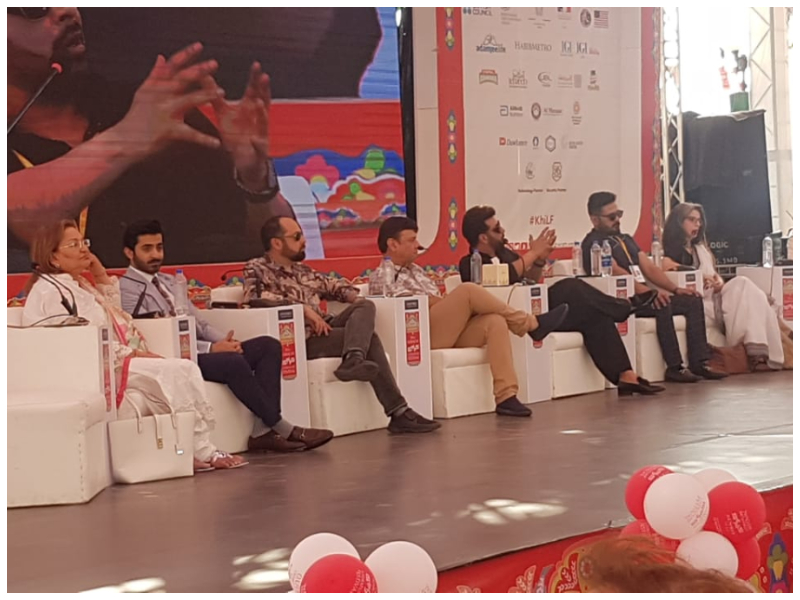Pakistani cinema is gradually on a path to discover its footing and find its own identity. The same subject was put forth at the 11th Karachi Literature Festival in a panel discussion titled ‘Pakistani cinema in the 21st century’.
Faseeh Bari Khan, Bee Gul, Saqib Malik, Faysal Qureshi, Sheheryar Munawar, Irfan Ahmed Urfi and Sangeeta Rizvi were the notable names who became a part of this discussion which revolved around the industry’s commercial success, censorship problems and creative expressions of different narratives.
Censorship ruckus
Moderated by Ally Adnan, the session first discussed the state of film censorship in Pakistan. Ally Adnan raised the question that ‘if there’s a justifiable reason to stop a film’? Keeping in mind the recent precedent set by a ban on the release of Sarmad Khoosat’s Zindagi Tamasha, it is a big concern now.
Playwright Bee Gul clearly stated that Sarmad came up with the best way out when he proposed that those who have issues with the content should watch his film in private screening, but no further development happened after this proposal. “I don’t see a way forward if this shift of power became irreversible,” she said.
Faysal Quraishi spoke in favor of censorship. He believes that some topics are “too out there” and that “our society isn’t ready for them”. Baaji’s director Saqib Malik had an opposite view on the matter. “It is as simple as one man’s freedom fighter is another man’s terrorist. If that were the case the writings of some the most celebrated writers like Ismat Chughtai and Manto would never have seen light of the day,” Saqib said.

Identity in question?
Another question that was raised during the conversation was about the identity of Pakistani films? Bee Gul believes that Pakistani cinema is far from establishing an identity; what’s needed is making different kinds of movies at the same time. “In order to find a true identity, all sorts of movies should be made, for all factions of the society,†she said.
Faysal emphasized that we should not compare Pakistani cinema to Indian cinema or any other cinema. Sheheryar Munawar, who is also a producer himself, shared that Indian cinema has gone through an evolutionary process and reached where it is now. “We are still growing, maturing and discovering our identity and are in the process of developing it,” he said.
Saqib also pointed out that we should not feel ashamed to see that our cinema has Bollywood influences. “Our history go beyond 1947; Calcutta, Lahore and Bombay used to be three major cinematic centers back in the day so it’s obvious to have similarities,” he added.
Portrayal of womenÂ
Another pertinent question that was raised was the portrayal of women in Pakistani cinema as well as television. Filmmaker Sangeeta shared that he made films like Society Girl and Muthi Bhar Chawal so early in her career when nobody would have thought of making films of such bold subjects.
Talking about the famous dialogue ‘do takay ki larki‘ from Meray Paas Tum Ho, Bee Gul shared that “the popularity graph of such dialogues is disturbing. Media houses support regressive thoughts and turn them into lucrative opportunities and unfortunately women are writing and selling such stories.”
While Sheheryar had an interesting take; he opined that “why can’t a woman make a mistake? Why is it so difficult to watch a woman make mistake on screen? I think it is a bigger burden on women to always stay perfect,” he said.
However writer Fasih Bari Khan stated that this will become a trend as most subjects do on television and everyone story will start revolving around a bad woman.
Read: KLF 2020: Here’s how young comedians are redefining satire in Pakistan
Item numbers
When asked if item numbers are a necessary evil or just for glamour packaging, Saqib spoke in favor. “We’ve demonized the concept of an item number. It is basically a song number which was always there in Pakistani films, be as a mujra or club number. It has nothing to do with Bollywood films. I think it’s an artistic choice, rather than a moral choice,” he said.
“I feel women feel sexually empowered by owning their bodies and doing item numbers,” he added.
Baaji’s writer Irfan Ahmed Urfi also stated that “it’s in our cultural conditioning that we condemn any form of entertainment.”
Producer’s predicament
With Indian content banned in Pakistan and scarcity of big Hollywood projects throughout the year, Pakistani cinemas are facing serious dearth of footfall. The situation of producers in worsening in this dilemma so should films be made in Pakistan?
“No, I think films shouldn’t be made in Pakistan. Producing films is extremely difficult in Pakistan. Even when the viewers like it and it breaks box-office records, the turnover takes a lot of time to reach the producer,” Sheheryar said adding, “the viability of our business model is faulty and until producers don’t get money back on time, how will they re-invest in another project?”
Sangeeta who is also the senior vice chairman of Pakistan Film Producers Association, added to the discussion as she thinks producers work the most but get the least money.
“With a population of 22 crore people, we can only see hardly 7 lacs in footfall. That’s how much difference we already have in numbers,” Faysal added.
“We have already 25 films on floor and almost 31 films are planning to release this year. We are operating on blind faith here,” Sheheryar commented.
With meaningful discussions, the panel raised relevant questions and answered a few as well. Moreover, it was heartening to see that despite innumerable hurdles, Pakistani writers, directors and producers are passionate to play a part in the growth of local cinema.



